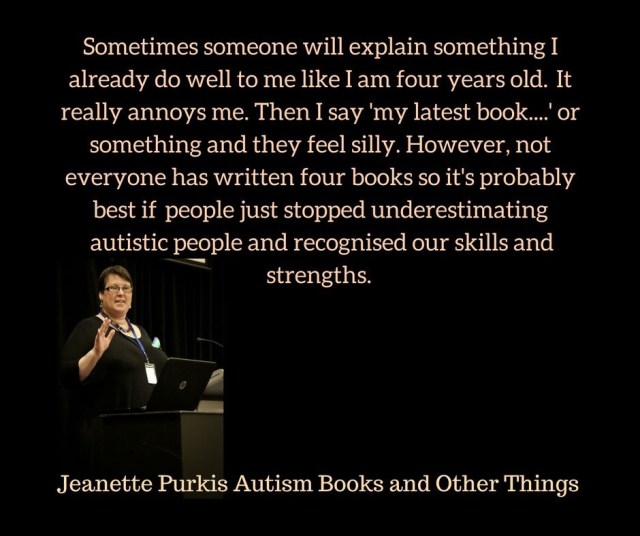The other day I was having a conversation with someone I have known on and off since my teenage years – before I was diagnosed. I was talking to her about my life and work. She asked me an odd question – ‘Do you work from home?’ I said that no I work in an office building with my colleagues. Then she asked how I got there. I told her I took the bus. Suddenly that terrible look came across her face. I’m not very good at reading looks but I usually I know this one all too well. She looked at me like I was a confused toddler and said ‘oh well done for getting the bus!’ as if of all my accomplishments that was the most impressive. The fact that the skills needed to do the work which I go to after I get off the bus are hard to acquire and that I am a highly valued employee in my workplace alongside very accomplished people was irrelevant. To this person I think the cogs in her brain which process autistic achievement may have seized up after the bus bit hence her not mentioning the work I do and all my other various activities. I was an impressive version of the autistic stereotype of not being able to use the bus. This kind of paternalism when applied to achievement by Disabled people is known is inspiration objectification – or as the late, great Stella Young aptly termed it ‘inspiration porn.’ Inspiration porn means calling people with disabilities inspirational on the basis of their disability. So my using the bus was inspirational because autistic people apparently find it hard. I think most non-Disabled people find relationships hard but I never go up to a couple that has been together for ten years and look up at them soppily and exclaim that they are an inspiration! (although after writing that I am a little tempted to…)
A non-Disabled person going to work or university or using public transport is almost never seen as inspirational but for those of us with pretty much any difference or disability, doing these things which are part of our daily life is somehow considered amazing and worth celebrating despite it being something we do anyway. It is like praising someone for eating breakfast!
One problem I come up against with this is that, as someone who overcame homelessness, addiction, abuse and violence and three years of prison – long story. Look at my autobiography for more details if you wish – that there are parts of my experience which actually are inspirational. I don’t mind when people compliment me on that as yes, kudos to me for being awesome – but catching the bus isn’t really up there with overcoming addiction!
I often find myself having to mentally wonder whether a statement about my life has been paternalistic and inspiration porn-y or is a genuine appreciation for some impressive thing I have done. I find that usually the gut reaction is right – if it feels like ick, walks like ick and quacks like ick – it’s ick! People tell me I inspire them quite a lot these days and it always confuses me. Wouldn’t it be nice of condescending people hadn’t ruined the term inspiration for me and everyone else quite so thoroughly that I constantly question genuine respect and appreciation?
I think that most Disabled people probably find this stuff infuriating and insulting. It seems to come from the place that someone sees us as somehow lacking and broken so that anything we do is seen as inspirational. It is like we are children well into our adulthood. Like a performing seal – ‘oh she took the bus! How exciting, Her parents must be overjoyed’.
I don’t want to be a performing seal or an eternal child. I have a lot of work to do and don’t need to waste time explaining this issue to people. I have many, many things to say and do for which I need no ‘inspiration’ validation. In many ways I am a very strong person but this stuff makes me feel diminished and sad. It is an insult to me and flies in the face of pretty much everything I do and say in my advocacy work. The genuinely impressive things we do can get ignored, eclipsed by the attitudes which focus on the tabloid moment, the metaphorical dog playing football.
The stuff makes me and many others angry. I think it should make people angry. I have been thinking about prejudice and bigotry lately. I know some people who are not intentionally hostile at people from different groups but their bigotry comes out in other ways. The worst problem I see with this is that it is almost impossible to call someone on this and get them to understand what the problem is. It often makes little difference to say anything to them and just adds to my frustration and their feeling of being attacked when they ‘don’t hate Disabled people…’ Paternalism and inspiration porn seem to me to be clear examples of that. They are expressions of ableism and a sense of superiority but not through using any noticeably overt hostile words. I would like for more attention to be paid to this covert bigotry because I for one am very sick of people discounting my Autistic and Disabled experience and focussing on what is essentially business as usual in my life and not realising the meaningful things I have done.
This is the link to Stella Young’s wonderful TED talk on the topic of Inspiration Porn. Please watch it if you get a chance. I would like it to be essential viewing for anyone working with or for us. https://www.ted.com/talks/stella_young_i_m_not_your_inspiration_thank_you_very_much


